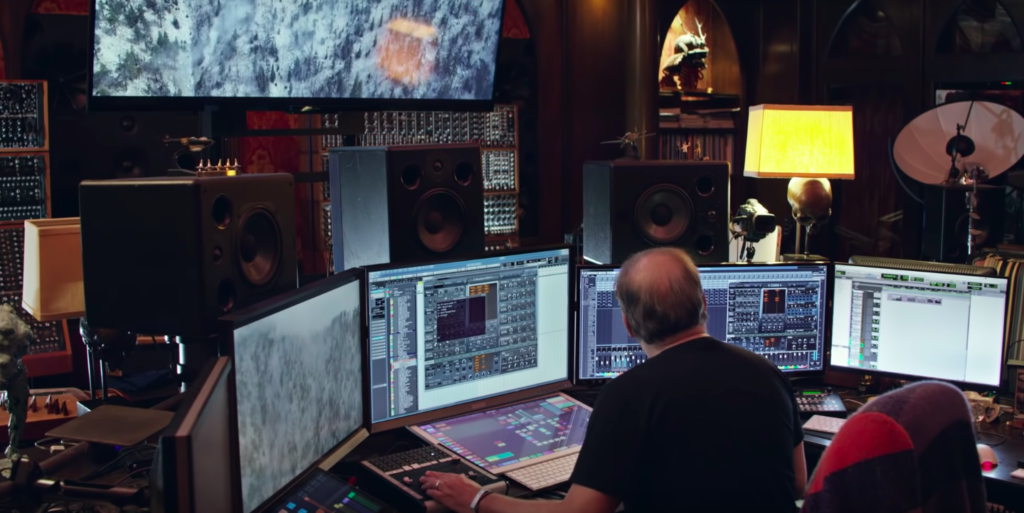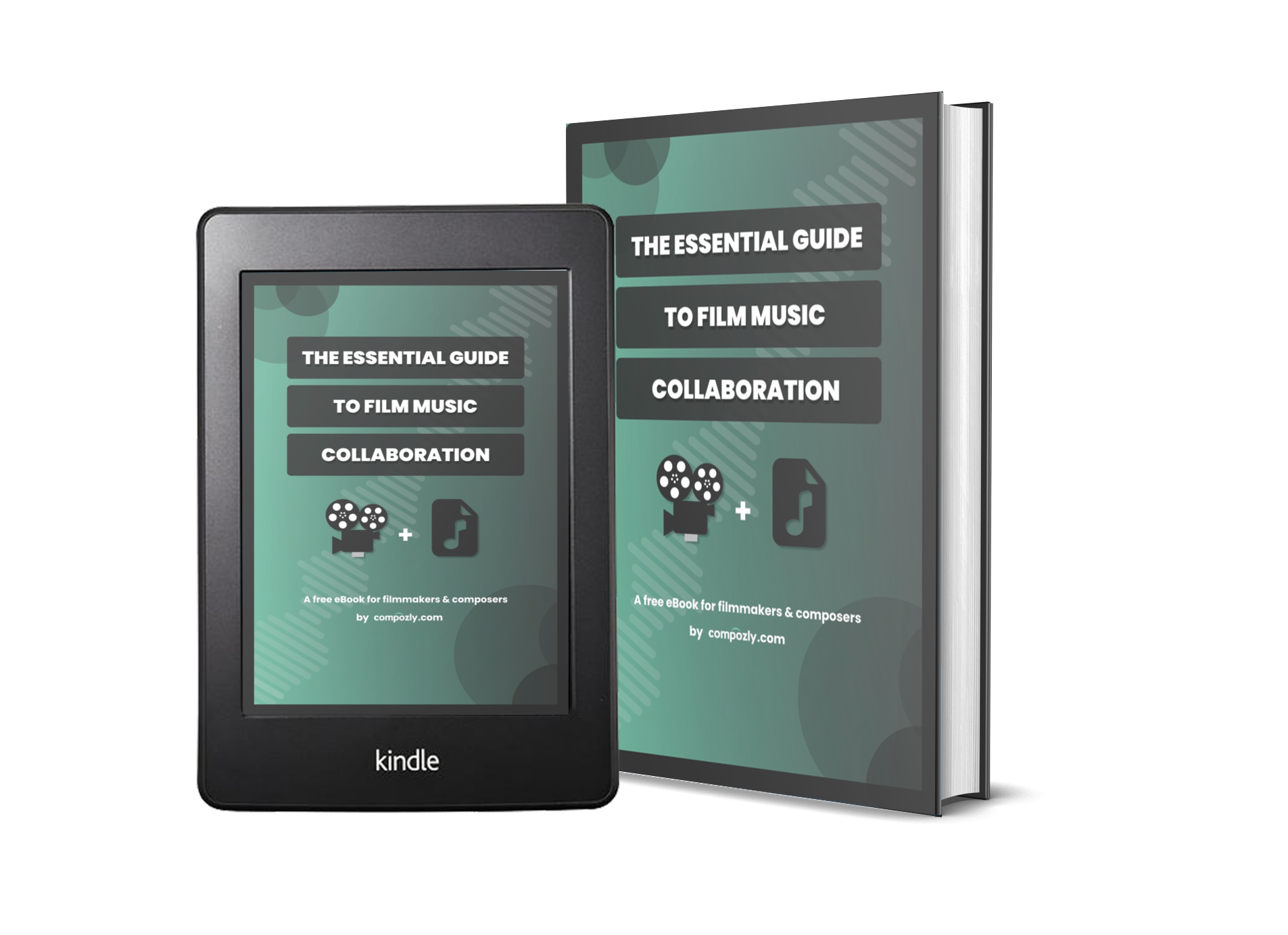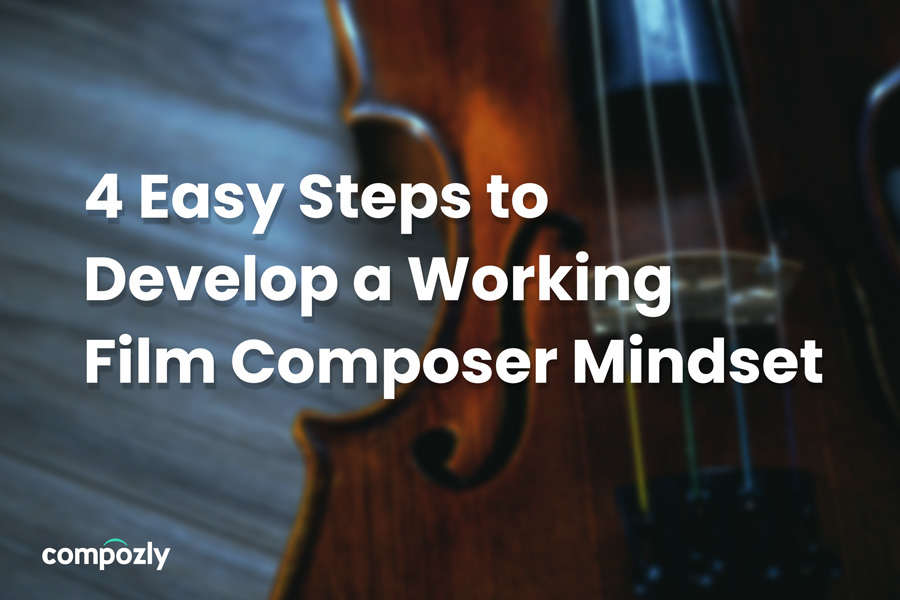Some of the world’s biggest composers all share similar steps in their development. Check out these quick four steps for developing a “composer mindset” in anyone with the passion and talent. Passion and talent can only take you so far, but a pure composer’s mindset will give you the clarity needed to becoming a successful film composer.
Step 1: Detemine if you’re a music or film composer
 Many of the best film composers aren’t necessarily the Mozarts of our generation, but rather they have learned to adapt to the ever-evolving film industry by being not just musicians, but storytellers. There are a large number of classically trained composers who lack the knowledge to achieve the filmmaker’s vision. Composer’s might create a beautifully written piece of music or two, but if it doesn’t fit the movie like a glove, that composer should either focus on songwriting or learn as much as you can about the movie industry, storytelling, and non-music parts of the gig.
Many of the best film composers aren’t necessarily the Mozarts of our generation, but rather they have learned to adapt to the ever-evolving film industry by being not just musicians, but storytellers. There are a large number of classically trained composers who lack the knowledge to achieve the filmmaker’s vision. Composer’s might create a beautifully written piece of music or two, but if it doesn’t fit the movie like a glove, that composer should either focus on songwriting or learn as much as you can about the movie industry, storytelling, and non-music parts of the gig.
Think of yourself as part musician and part storyteller, since both are incredibly important to being the best “film” composer possible. If visual entertainment isn’t one of the biggest reasons you’re in this field, I highly recommend releasing original music, creating music for stock libraries, or even teaching composition skills. The reason you need both is because without the music side, you can’t create the music. Without the film side, you might only be able to create the music, but it’s nowhere near what the screen is asking for.
To sum this up, think long and hard about whether you want to be a music composer or a film composer, as both require different skills and interests. To throw in a real world example, I like to think of composer Hans Zimmer more of a filmmaker who can create unique music to fit the story (this is me), while John Williams is a classical music composer who also has instincts about how music works within the scope of a story or movie. Which composer type are you? Understanding this is the root of the film composer mindset and a great starting point to understanding yourself so that you can follow the correct path that’s right for you.
Step 2: Develop a plan to “sell yourself”
 Now before you skip this step, thinking that you don’t want to sell yourself out, try to reframe that phrase as less of you being a salesperson and more about presenting your best self in every aspect. Many salesmen are pushy, manipulative, and slightly irritating, but rather than thinking about getting gigs by selling your services, think about yourself as a product that can continue to improve. Would you rather be a product that sticks out from the rest, where people are drawn to and referred to, where you don’t have to say a word? Or do you want to be the composer who pushes producers and directors to hire you?
Now before you skip this step, thinking that you don’t want to sell yourself out, try to reframe that phrase as less of you being a salesperson and more about presenting your best self in every aspect. Many salesmen are pushy, manipulative, and slightly irritating, but rather than thinking about getting gigs by selling your services, think about yourself as a product that can continue to improve. Would you rather be a product that sticks out from the rest, where people are drawn to and referred to, where you don’t have to say a word? Or do you want to be the composer who pushes producers and directors to hire you?
Personally it feels much more fulfilling to have people pulled to you than to push yourself towards people. This means crafting a fantastic web page, composer reel (audio examples AND a visual reel) and sharing your best work so that you’re referred to by other directors. This can easily be done by creating your Compozly social profile when you sign up for a free account. Always remember to be a Baby Yoda, not Kylo Ren (for non-Star Wars people, this means let yourself be so awesome that everyone is drawn to you, don’t feel the need to “force-pull” directors to you.)
Step 3: Practice writing music to picture
 As many film composers can attest to, there will be times when you’re not working on a score and need to keep up the writing and creativity. Many composers will just take that time off to write original music, work on the business side, or take a vacation (if the payment was good haha).
As many film composers can attest to, there will be times when you’re not working on a score and need to keep up the writing and creativity. Many composers will just take that time off to write original music, work on the business side, or take a vacation (if the payment was good haha).
One thing you can include in your non-working part of the year is to practice scoring to a variety of visual content (without music). Create your own story and scenario, then write music to that picture that you feel would work with a mixture of the visuals and your made-up story. This is a great way to practice composition but also hammering in what music goes with each emotion and visual, so that when you have a real score, it’ll be easier for you to jump into it and have more ideas initially. Check out this site “Videezy” for free 4k videos you can download, which helps to stimulate your film composer brain when you aren’t able to work on a paid project.
Step 4: Develop a second musical idea for every main idea
 Many directors will listen to your score and a lot of times they will know what they “don’t” want, but not necessarily what they “do” want. This is when your “second idea” comes into play! What I do in many of my scores is to create a second idea for each cue. Many times there’s a deadline and this is not possible, however if you have extra time to work, having a second idea immediately at the ready will be a great tool and also impress the director.
Many directors will listen to your score and a lot of times they will know what they “don’t” want, but not necessarily what they “do” want. This is when your “second idea” comes into play! What I do in many of my scores is to create a second idea for each cue. Many times there’s a deadline and this is not possible, however if you have extra time to work, having a second idea immediately at the ready will be a great tool and also impress the director.
They may immediately say a part isn’t working, and at that point you can bring out the secondary music cue to present to the director. Like I said, timing is the biggest factor here, so only do this when you have extra time to present these extra ideas to the director. If you cannot come up with a secondary idea, this might mean that the cue you have is already great for the scene, or you’ll need the director to help you figure out what should go there instead. In these cases, it’s paramount that you can state your case as to why the music you currently have should be there. Not from a musical perspective, but from a storytelling perspective. If you can talk to the director about why your music fits perfectly with the scene based on the story they’re trying to tell, this is a valuable skill.
Many directors will say “sorry, this doesn’t work”, and a lot of times it is best to redo the music based on what they have in mind. However, if you feel strong about why the current music would work for that scene, state your case methodically. Filmmakers will many times take the composers final word, especially if you can explain to them how it makes the scene/film better. This step is the hardest to do consistently, as it requires double the work and the ability to “sell” the music you wrote for that scene and why it helps tell their story.
These are just some of the main steps for training your film composer mindset, but continuing to learn about composition, filmmaking, and even marketing as you progress in this career, will allow you to grow as a composer AND filmmaker.

Get your FREE copy of "The Essential Guide to Film Music Collaboration" to help create better music for your film and video projects.
About the Author

Adam Robert Galloway
Film Composer
© 2024 Compozly, LLC ALL RIGHTS RESERVED

